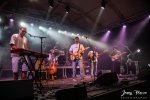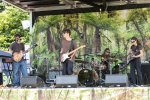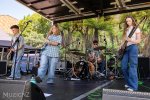Tomahawk Radio - Album Review: Dreaming With A View
 Tomahawk Radio’s debut album, Dreaming With A View follows their recent single release of the pop tinged
rock song Missiles. The band is effectively listenable, soft, alternative rock, but perhaps ‘soft’ is not a favourable way to describe them – ‘sensible’ might be better. They are radio friendly in the way a producer might steer less talented musicians
toward, but I could certainly imagine a wide range of people listening to them in all sorts of scenarios; a film soundtrack, a music video set in Otago, an advertisement...
Tomahawk Radio’s debut album, Dreaming With A View follows their recent single release of the pop tinged
rock song Missiles. The band is effectively listenable, soft, alternative rock, but perhaps ‘soft’ is not a favourable way to describe them – ‘sensible’ might be better. They are radio friendly in the way a producer might steer less talented musicians
toward, but I could certainly imagine a wide range of people listening to them in all sorts of scenarios; a film soundtrack, a music video set in Otago, an advertisement...The band is well presented here with lush reverb, tasteful tight drumming, and a balanced mix that is rich with shimmery guitars, occasionally joined by Rhodes piano lines, topped by the reedy voice of Jeff Avery and the rest of the band who also sing.
Coming from Dunedin they might be associated with the jangle-pop of famous luminaries such as The 3Ds, The Clean or Straitjacket Fits, and there is that element present, but Tomahawk Radio are somehow more professional and polished than those more well-known acts.
Across the album there is tasty, practical overdriven guitar tones that fit well next to the more shimmery notes of the other guitar. The bass here supports the other instruments, maybe to the point of invisibility at times, while the drums introduce new songs and parts with small but surprisingly deft fills.
But, let’s be honest, the real star here is the emotive chord progressions that point toward a country influence. Occasionally the sound like a New Zealand R.E.M., and do I hear some inspiration from Fleetwood Mac and other 1970’s AOR rock?
The album kicks off with Dreamer, which features a simple spacey solo within its pop rock, sing-a-long format then ends on a great and unexpected chord. It’s a well-chosen opener to display what the band are capable of.
The album continues with Delusion which offers more of the same well-balanced balladry, only it's a little slower, including an even more emotional chorus and bridge. There’s a brilliant chord progression on offer here, but I can’t quite place where I’ve heard it before despite it seeming so familiar. Again, there’s an epic, but simple guitar solo comprised of well-chosen notes.
The Phone Rings starts with a Rhoads keyboard part, introducing another potential single for the album. Here, the band slows down further but there are moments of emotive frustration in the voice and expressive drum fills.
Sunshine has some great dual vocals within the poppy, shimmery goodness. The song has an amazing ending that would work well in the live setting.
Hit A Nerve brings the rock back up with a melodic riff, but it all comfortably returns to the same mid-tempo pop. Not that it’s a bad thing, or an easy thing to balance all the instruments so well. Still, I feel just a little disappointed the band has returned to the same vibe after the more energetic introduction.
Almost Drowned starts with a clever little drum pattern and another carefully crafted chord progression. Vocals sound a little different hear, as if they are mixed with a different hierarchy from the other songs.
Missiles, the single, erupts out the gate with a shifty little riff with a tasteful bit of keyboard helping form the chords and outline the melody. This is great song about both our modern times and the similar Cold War era of MAD. There’s a cool music video on YouTube for this song that has a live performance of the band and some retro footage. Check it out.
Time, the slowest track, uses deep reverb and a diminished chord for extra emotional impact at the turnaround. It's slow-dance material, but probably the type of song better enjoyed alone looking out over a natural landscape. A cool little wah riff adds some flavour here. The placement on the album is perfect as things come to close.
However, the band surprises the listener with the final track, To Your Lover which totally rocks with some delicious overdrive. What an end!
All in all, it's hard to fault this band’s effort. This album is a sophisticated gem with strangely familiar melodies, beautiful chord progressions paired perfectly with layered vocals and dreamy guitar. What it lacks in originality perhaps it makes up for in professionalism. Some snobby reviews might reject such efforts, (think Pitchfork and some other indie loving entities who reward experimentation) but you’ve got to hand it to them for making such a listenable collection of tunes. There is a boldness here; not in trying to reinvent the wheel (as many rock acts have attempted before them), but being bold enough to even attempt to refine the wheel further to a polished finish.
A wonderful impressive record, … it’s just a bit shiny.
About Tomahawk Radio

Singer, bassist and surfer Brian Graham bought his wind buffeted Otago Peninsula home so he could keep an eye on the waves at both Tomahawk and Smails Beaches. When he realised his dream of building a music studio adjoining the house, he and bandmates Jeff Avery and Luis Rodriguez got serious about developing the band’s sound and releasing some songs.
After a couple of years trying different drummers to join them, they finally found the perfect match with drummer and composer Scott J Mason, who brought his Rock playing experience into the sound.
Visit the muzic.net.nz Profile for Tomahawk Radio
Releases
Other Reviews By Nicholas Clark
 Search For Yeti - Album Review: Dark So Soon
Search For Yeti - Album Review: Dark So Soon
28 Nov 2024 // by Nicholas Clark
Search for Yeti’s first full length album Dark So Soon offers a rich banquet of genres and melodies. The record oscillates between predicting a future filled with either dread or hope, while the band either softly establishes a tender ambience or plays catchy power pop.
Read More...
 DarkWater - Album Review: Turning Point
DarkWater - Album Review: Turning Point
13 Nov 2024 // by Nicholas Clark
Turning Point is a complex, dynamic album that takes the listener on an intense ride. There are mysterious, fragile, powerful and gritty moments to discover on this ten-track offering that sounds both balanced and refined.
Read More...
 Job Site - EP Review: The New Zealand Experience
Job Site - EP Review: The New Zealand Experience
15 Oct 2024 // by Nicholas Clark
Emerging from the Waikato, high energy punk band Job Site showcases their special blend of comedic music on their latest offering, the 4 track The New Zealand Experience EP. The band plays fast and heavy throughout the recording, with rhythms that range from oi-punk, thrash music and even a little 2000’s indie rock.
Read More...
03 Sep 2024 // by Nicholas Clark
Six iconic venues. Twenty eight acts.
Read More...
 Voodoo Bloo - Album Review: Dead-end Rodeo
Voodoo Bloo - Album Review: Dead-end Rodeo
28 Aug 2024 // by Nicholas Clark
Rodeos, at least in this country, aren’t perceived as sport nowadays. If the term is used at all in New Zealand it usually refers to a metaphor for an intense struggle to survive or to conquer the unconquerable, if but for fleeting moment.
Read More...
 Gig Review: Bad Schematics @ Moon, Wellington - 26/07/2024
Gig Review: Bad Schematics @ Moon, Wellington - 26/07/2024
27 Jul 2024 // by Nicholas Clark
Fresh from picking up numerous awards in the recent National Battle of the Bands competition, Bad Schematics have embarked on a North Island tour including Tauranga, Auckland and their hometown Palmerston North, to promote their newest album,C O L L I D E. Tonight, along with winners of the competition for this year, Adoneye, finalists Donal and The Bucks and last year’s second place winners, Dave and the Dirty Humans, Bad Schematics hit Wellington’s favourite underground alternative music venue and pizzeria, Moon.
Read More...
 Gig Review: Floyd Marsden @ Valhalla, Wellington - 18/07/2024
Gig Review: Floyd Marsden @ Valhalla, Wellington - 18/07/2024
19 Jul 2024 // by Nicholas Clark
Although technically a sad affair, (as it was to be final of Floyd Marsden’s string of local shows promoting her album The Disco Lizards), the atmosphere in Valhalla was uncharacteristically filled with retro vibes but the usual friendly faces. In support for this show was Adult Friends, spearheaded by vocalist/guitarist Jackson Kidd who was also the producer of The Disco Lizards.
Read More...
 SuperMild - EP Review: SuperMild
SuperMild - EP Review: SuperMild
11 Jun 2024 // by Nicholas Clark
SuperMild is a busy band playing lots of venues and entertaining crowds with their blend of reggae tinged psychedelic rock. Their debut, self-titled four song EP is out now, and it spans the many sounds the band can summon with just three members.
Read More...
Most Viewed Artists
Latest Galleries

Evan Rhys & the Stereo Streets @ Festival of Lights - Pukekura Park, New Plymouth - 18/01/2025
Midwave Breaks @ Festival of Lights - Pukekura Park, New Plymouth - 18/01/2025
Rumpus Machine @ Music in Parks, Aotea Square, Auckland - 18/01/2025
Fan Club @ Music in Parks, Aotea Square, Auckland - 18/01/2025
NZ Top 10 Singles
- APT.
ROSÉ And Bruno Mars - DIE WITH A SMILE
Lady Gaga And Bruno Mars - BIRDS OF A FEATHER
Billie Eilish - TASTE
Sabrina Carpenter - I LOVE YOU, I'M SORRY
Gracie Abrams - ESPRESSO
Sabrina Carpenter - SAILOR SONG
Gigi Perez - LOSE CONTROL
Teddy Swims - A BAR SONG (TIPSY)
Shaboozey - GOOD LUCK, BABE!
Chappell Roan





 Report A Problem
Report A Problem

